Yes, AM/FM Radio Attribution For Site Traffic And Search Can Be Measured: LeadsRx 17-Campaign Analysis Reveals A +14% Average Increase In Website Traffic Due To AM/FM Radio Advertising
Click here to view a 21-minute video of the key findings.
Click here to download a PDF of the slides.
Over the course of five years (from 2019-2023), the Cumulus Media | Westwood One Audio Active Group® has commissioned LeadsRx, a leader in measuring the impact of advertising on site traffic, to conduct 17 attribution studies for brands spanning a variety of categories.
The categories included tax preparation services, B2B supplies/services, apparel and jewelry retailers, financial institutions, job websites, subscription managers, identify theft protection, online therapy apps, vitamin supplement subscription services, and a haircare supplement.
The studies examined attribution by day of the week, daypart, and by AM/FM radio programming format. There were also creative assessment insights that can be utilized by brands to optimize advertising impact.
LeadsRx: Search and site attribution for AM/FM radio campaigns
LeadsRx’s marketing attribution capabilities for AM/FM radio, television, and digital are some of the most advanced in the industry, with thousands of advertisers using LeadsRx to make optimizations on media buys and ad creative.
Using LeadsRx, advertisers can:
- Utilize a flexible attribution window that allows for changes in the period of attribution credit from seconds to hours at the individual spot level.
- Geofence visitors into Nielsen DMAs to assess local exposure and site traffic impact.
- Apply channel filters to remove or include the impact of other marketing programs.
- Monitor decay curves to examine how website traffic changes throughout the campaign.
- Arbitrate station overlap with split credit or via decay curves, impressions, or both.
Methodology: How LeadsRx determines search and site attribution for AM/FM radio campaigns
LeadsRx receives total AM/FM radio campaign ad occurrence data via Media Monitors. Every ad run on AM/FM radio is included. Appended to each ad occurrence are Nielsen impressions.
LeadsRx then analyzes the LeadsRx Broadcast Attribution Tag via a standard API or file upload. Incremental lift as well as share of campaign impressions against the share of attributed web sessions are analyzed.
National campaigns are examined by studying local ad occurrence and advertiser site traffic from each Nielsen DMA. For example, all the ad occurrences and Nielsen impressions from Des Moines are analyzed against the site traffic from Des Moines. The same analysis occurs in another DMA. The national campaign impact is compiled based on the roll up of all the local markets where Media Monitors measures ad occurrences.
Here are the key takeaways from the 17 studies:
On average, AM/FM radio campaigns generated a +14% lift in site traffic across the 17 campaigns
Campaigns are measured against LeadsRx benchmarks to determine the performance of attributed lift. The scale ranges from a small attributed lift (0% to +3% lift) to excellent (+15% or more).
Across the 17 campaigns analyzed, the average attributed lift was +14%. Three tax preparation service campaigns achieved “excellent” status ranging from a +30% to +48% attributed lift.
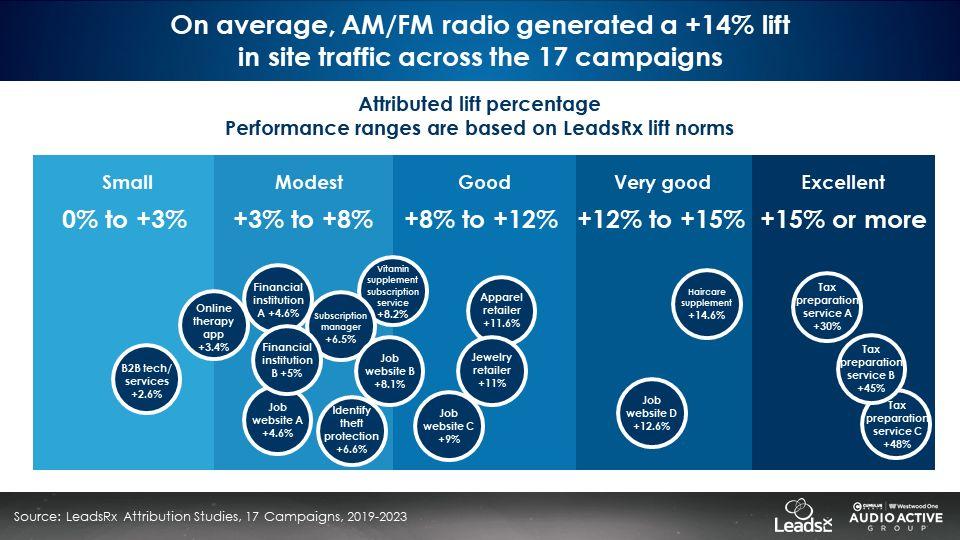
Following the three strongest performing campaigns for tax preparation service brands, a haircare supplement achieved a “very good” (+12% to +15%) performance along with a job website. Brands in the “good” attributed lift percentage range (+8% to +12%) included retailers (2 campaigns), job websites (2 campaigns), and a vitamin supplement subscription service.
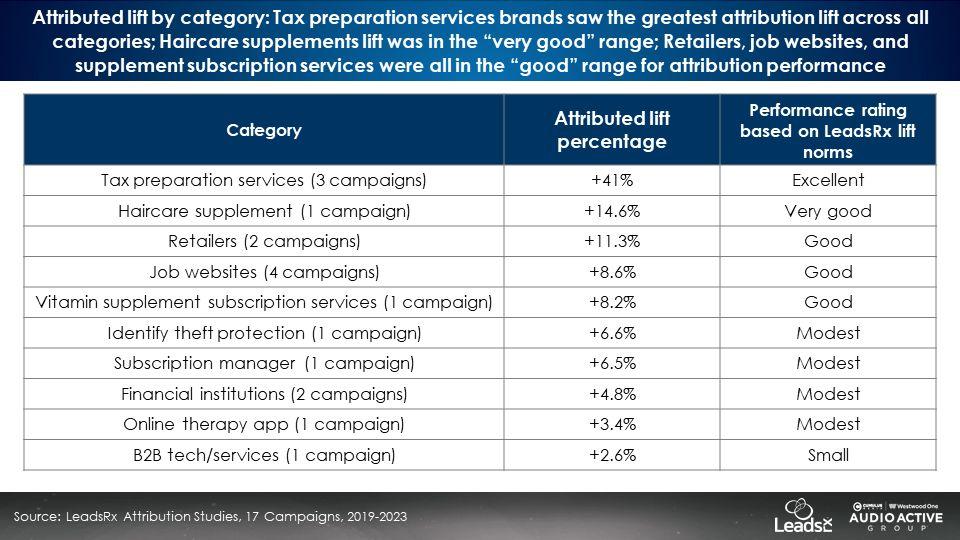
While tax preparation services saw the greatest attribution lift likely due to so many Americans needing to file taxes within a very short time period, the attributed lift categories also reveal AM/FM radio works for retail and impulse purchases. These campaigns experienced a substantial increase in web traffic following the AM/FM radio ads, often seeing more than a fivefold lift. AM/FM radio exposure leads to more spontaneous, spur of the moment conversion events.
Day of the week: Compared to the share of Nielsen impressions, the 17 AM/FM radio campaigns’ share of attributed web sessions outperformed on weekends and Mondays
On average, the 17 AM/FM radio campaigns saw the highest percentage of impressions at the start of the week, peaking on Mondays and Tuesdays. Compared to the Nielsen impressions, the AM/FM radio campaigns outperformed on Saturday, Sunday, and Monday.
Advertisers should increase their use of AM/FM radio on the weekends. AM/FM radio campaigns on weekends drive impact and results.
According to Nielsen, 21% of all U.S. AM/FM radio listening occurs on weekends, slightly more than morning drive (20%) Monday to Friday, 6AM-10AM. LeadsRx studies reveal that weekend AM/FM radio punches above its weight, generating a greater share of attribution web sessions than the share of campaign impressions.
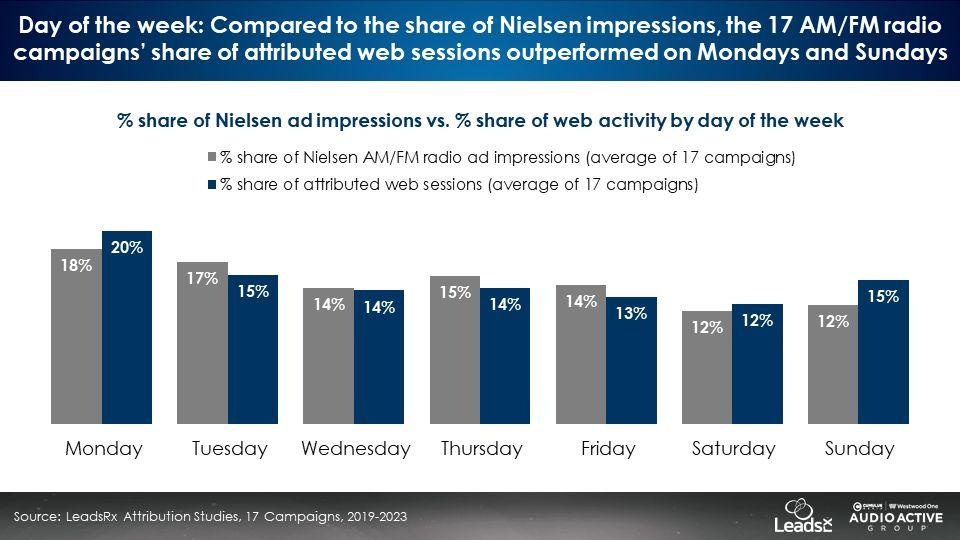
Daypart: On average, evenings have a greater share of attributed web sessions due to available devices and free time of consumers
Mornings historically underdeliver their share of impressions since consumers are busy getting ready for work and school. This expected pattern should not be a reason to move campaign weight out of morning drive. Morning drive exposure results in web sessions during later dayparts when consumers have the time and available devices to respond.
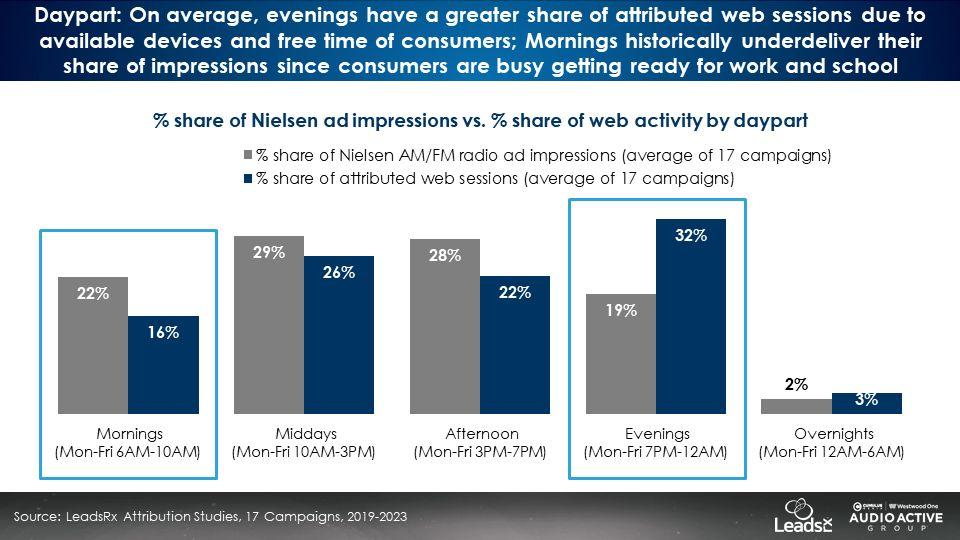
The heavier media weight by market, the greater lift in web traffic
On behalf of iHeartMedia, LeadsRx previously conducted the world’s largest study of media impact on auto website traffic. Website traffic was measured from 310 auto dealers covering 19 vehicle brands in 100 markets for a 17-month period. A total of 1.8 million AM/FM radio commercials were studied to develop auto dealer best practices for AM/FM radio advertising.
One of the key findings of the study was that the greater the number of AM/FM radio ads run in the market overall, the greater the web traffic:
- Auto dealers who ran ten AM/FM radio ads daily in a market experienced a 12% site traffic lift.
- Dealers running 20-29 ads a day saw a 23% increase in site traffic.
- Dealers that ran 40 or more ads in the market saw a massive 55% lift in their website traffic.
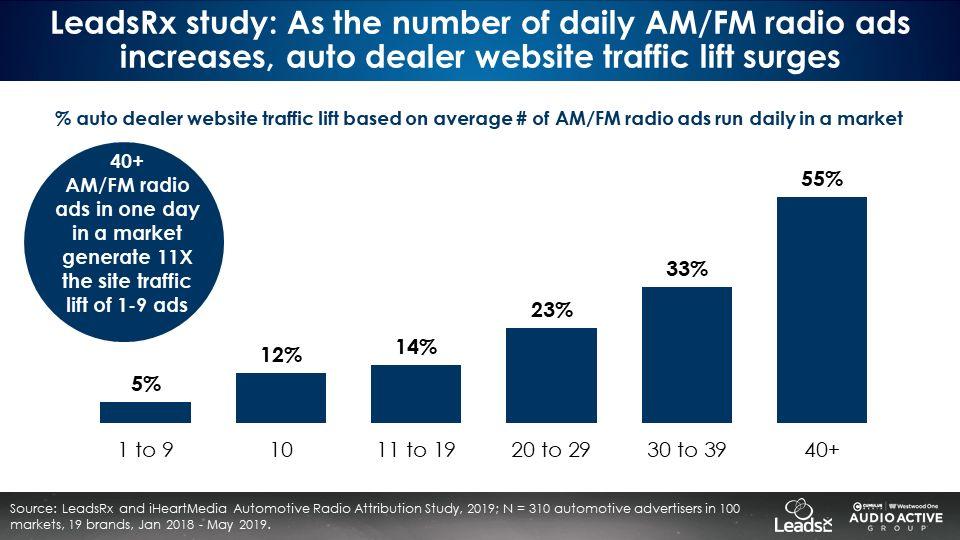
A recent apparel retailer’s campaign revealed the same results. Markets that received the greatest GRP levels saw an average attributed lift of +27%, more than 2X the average of the total campaign.
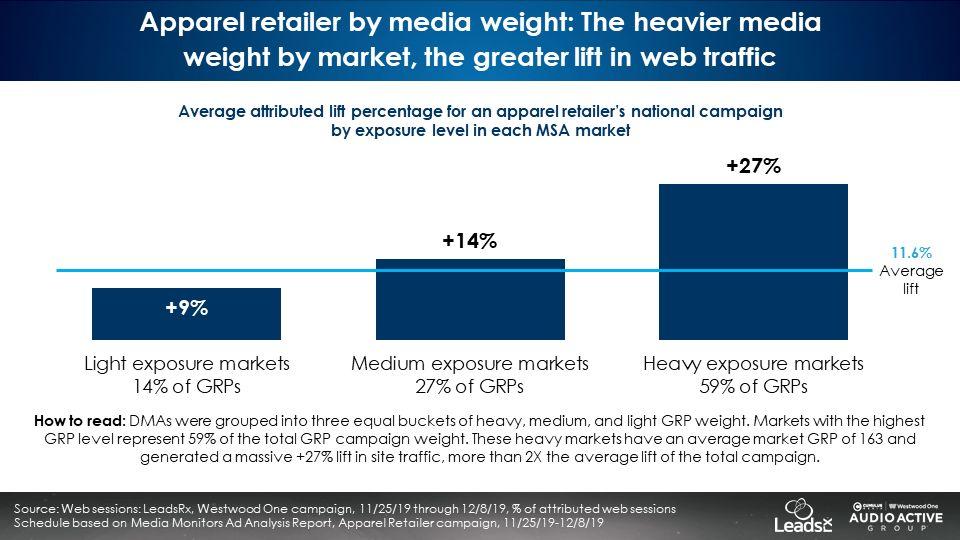
AM/FM radio programming format: A wide variety of AM/FM radio formats drive search and site traffic; Attributed site traffic from spoken word formats (Sports and News/Talk) out deliver Nielsen impressions
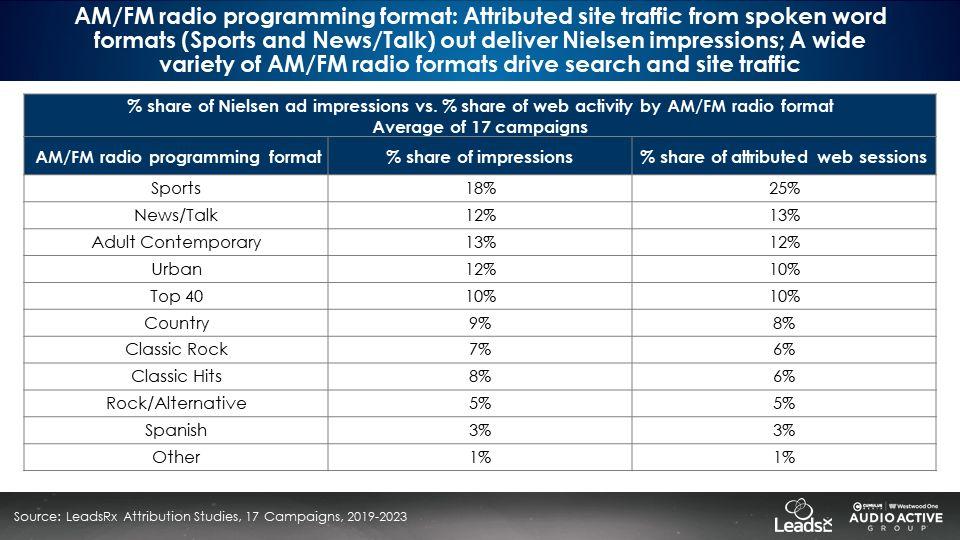
Creative analysis: A jewelry retailer’s creative that highlighted price matching and a rewards offer were the leaders in driving attributed web traffic
LeadsRx can measure the impact of different creative executions. Creative is critical to driving sales and ROI. According to NCSolutions sales effect studies of nearly 450 campaigns, creative was by far the strongest sales driver, impacting almost 50% of sales lift.
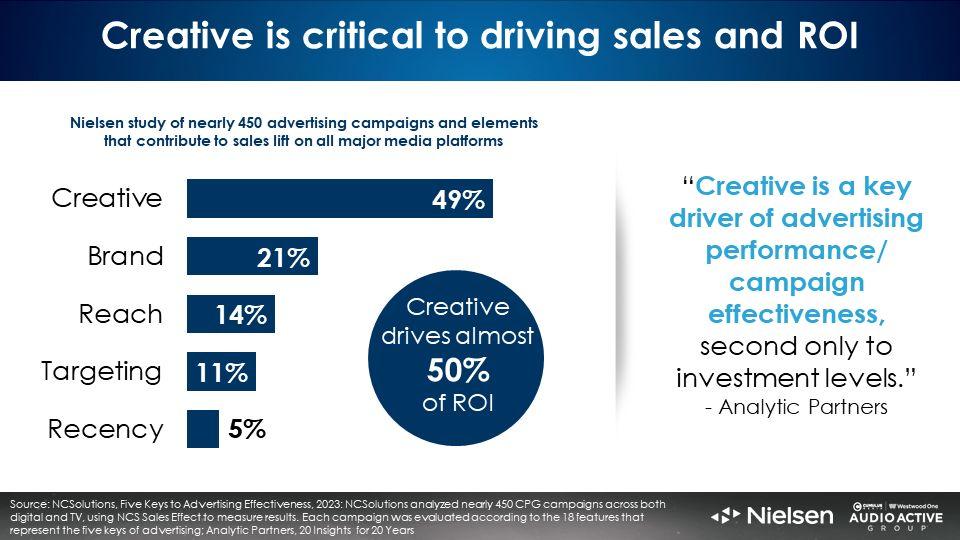
A jewelry retailer found that their ads focused on a rewards offer and a price match drove the greatest attributed web traffic. In fact, the rewards offer (spend $500, get a $200 store credit) achieved as many web sessions as the price match ad with half the media weight.
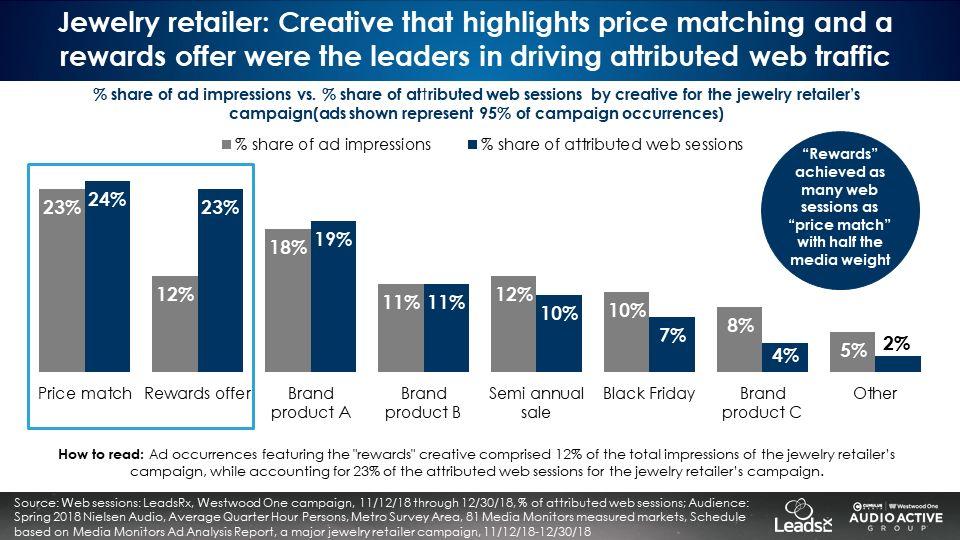
Brand early and often: The highest performing ads mentioned the brand within the first five seconds
According to the LeadsRx analysis of one of the tax preparation service brand’s campaigns, ads that mentioned the brand within the first five seconds of the ad performed best.
According to Nielsen, consumer engagement with an ad drops off after the first five seconds. As a best practice, ads should clearly communicate their name early and often. Veritonic, a leader in audio creative research, recommends the brand be mentioned four to six times in an ad.
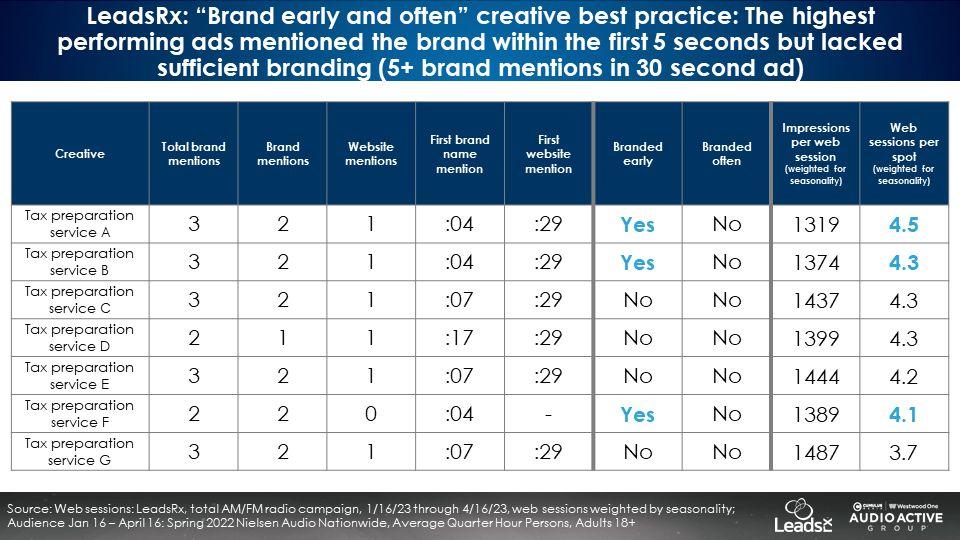
Key takeaways:
- On average, AM/FM radio generated a +14% lift in site traffic across the 17 campaigns measured by LeadsRx.
- Day of the week: Compared to the share of Nielsen impressions, the 17 AM/FM radio campaigns’ share of attributed web sessions outperformed on weekends and Mondays.
- Daypart: On average, evenings have a greater share of attributed web sessions due to available devices and free time of consumers.
- The heavier media weight, the greater lift in web traffic.
- AM/FM radio programming format: A wide variety of AM/FM radio formats drive search and site traffic; Attributed site traffic from spoken word formats (Sports and News/Talk) out deliver Nielsen impressions.
- Creative analysis: A jewelry retailer’s creative that highlighted price matching and a rewards offer were the leaders in driving attributed web traffic.
- Brand early and often: The highest performing ads mentioned the brand within the first five seconds.
Recommendations:
- Do not overreact to the strong conversions of evenings/nights, nor the weaker relationship between morning impressions and attributed web sessions. Consumers are busy in the morning. At night they have lots of time and devices. Morning drive exposure impact results in later dayparts. Resist the temptation to move weight from mornings to evenings. The proportion of U.S. AM/FM radio listening that occurs in the morning (20%) is two and a half times greater than AM/FM radio’s evening audience (8%).
- Ensure weekends represent at least 21% of campaign weight. Nielsen reports 21% of all American AM/FM radio listening occurs on weekends, slightly more than Monday-Friday 6AM-10AM. LeadsRx found weekend AM/FM radio’s share of attributed web sessions outperforms the share of Nielsen campaign impressions. On weekends, AM/FM radio punches above its weight.
- Understand day of the week attribution trends by category. For example, tax preparation services don’t show a lot of response on the weekends but Mondays really pop when consumers are getting back into the work week.
- Make sure your brand is known during predictable periods of need for a product or service. Advertising offerings that are tied to specific seasons, such as tax preparation services during tax season, show a strong performance. This indicates that timing the campaigns to coincide with seasonal demand can significantly enhance effectiveness.
- Heavy up media during periods of seasonal category demand and need. For example, the jewelry retailer saw its attributed web sessions overdeliver Nielsen impressions during December, the pre-holidays shopping period.
- Buy a broad array of programming formats as shoppers are found across many AM/FM radio genres. AM/FM radio campaigns drive responses from all sorts of programming formats. Avoid just buying the stereotypical “obvious fit” formats, ie. Country for a military insurance campaign or Top 40 for an cosmetics brand. According to the WARC, (World Advertising Research Center), reach is the foundation of media effectiveness. Spread media weight across a diverse set of programming formats to grow reach and results.
- Align to the consumer’s purchase mindset with copy tailored to attractive offers. Strong offers outperform weak offers. To truly drive site and search activity there has to be a very compelling offer. AM/FM radio gives brands the ability to influence purchase decisions when they are on their way to the store and during key buying windows.
- Brand early and often. Mention the name of the brand in the first three seconds and at least five times in a thirty second ad. The more brand mentions in an ad and the more times a website is mentioned, the greater the attribution performance.
Click here to view a 21-minute video of the key findings.
Pierre Bouvard is Chief Insights Officer of the Cumulus Media | Westwood One Audio Active Group®.
Contact the Insights team at CorpMarketing@westwoodone.com.